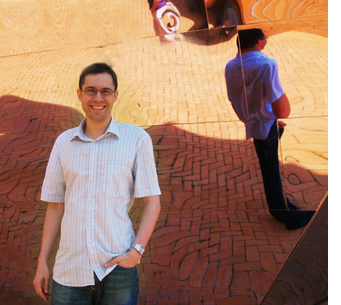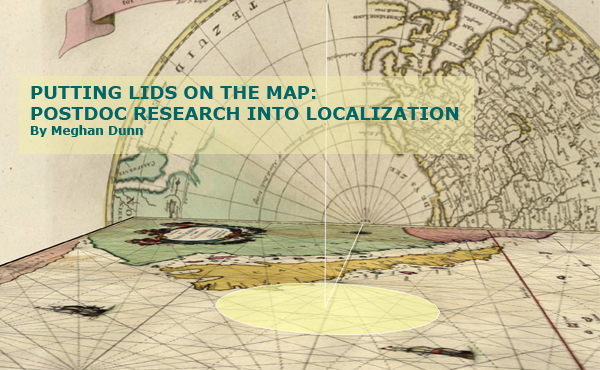When Henk Wymeersch arrived at LIDS from the Belgian university not far from his tiny hometown, he had a list of potential research topics “pages and pages long.” Rather than immediately focusing on one topic, Henk took the time to brainstorm with his host, Professor Moe Win, and decided to write a book on iterative processing, which he describes as a kind of “Iterative Processing for Dummies.” Iterative Receiver Design was published by Cambridge University Press in 2007. Henk, wiry and cheerful, is modest about this rather significant achievement. “It’s very exciting,” he says. “It was really nice of Professor Win to give me the freedom to pursue this.”
And that’s only the beginning of his LIDS experience, which has brought him far from Vinderhoute, Belgium, population 600. Henk first completed his B.S., M.S., and P.h.D. at the nearby University of Ghent. “Belgians don’t like to move very far,” Henk says, laughing. “Most people do undergrad, grad school, postdoc at the nearest university, and some eventually become professors there.” Henk broke with this tradition in 2005 when he was selected for a fellowship through the Belgian American Educational Foundation, which allowed him to continue his research at any U.S. university. He chose MIT, but says, “it was a nervous experience. I didn’t know what MIT was like. In my head, there were older buildings, brick walls, professors in old, book-lined offices. I had this picture in my mind, but every bit of it was wrong.”
Instead of those musty offices, Henk works in the Stata Center with Professor Win’s W Group (for wireless and wideband). The group’s interdisciplinary approach has allowed him to branch off from his Master’s and Ph.D. research and explore new areas. “Our group is special,” he says, “because we do theory, we do algorithms, and we do experimentation.” Right now, some of that multi-pronged research centers on the problem of localization, which builds off Henk’s background in iterative processing.
Localization is what it sounds like: attempting to fix a location to someone, or something, in relation to other people or objects. When this person or object is mobile, localization is particularly tricky. Researchers must gather information about other objects or people in the area through an iterative, or repeated, process. Henk explains that an iterative process is a way of addressing a larger problem by breaking it into smaller pieces and using the solution to one piece to solve the next sub-problem.
In the communications context, iterative processing is an efficient way of decoding bits of information that are sent from a transmitter to a receiver. Essentially, the receiver uses the pattern established by the bits of information it gets first to decode the bits that come later, allowing it to decode the entire message more quickly and accurately. Localization requires that the iterative approach go one step further, by moving the process from a receiver box to a network.
While localization has many potential applications, consumers are probably most familiar with its use in cellular phone networks, which allows participating users to see where their friends are. However, the current consumer technology for localization of this type still depends on communication between the mobile device and fixed base stations. If a cell phone is in range of three base stations, its location can be determined. Henk explains, “these base stations have known locations, since they don’t move. A cell phone can localize itself by measuring the distance between itself and at least three base stations.” But this existing architecture is ultimately limiting. If the device is out of base station range, localization isn’t possible.
Part of Henk’s current research addresses this problem. “I’m working on an architecture, which depends on both base stations and the network,” he explains. In other words, if one user in the network were able to localize by connecting to a base station, other users in the network, who might be out of range, could determine their own locations by connecting to the localized user. He elaborates, “Maybe you know where you are, but I don’t know where I am. I could talk to you directly, figure out my distance, my position with respect to your position. I don’t need to be able to talk to all three base stations.”
This research is Henk’s real passion right now, although he makes time for running on the beach in Dorchester and attending events sponsored by MIT’s EuroClub. He responds to his friends’ and family’s questions about his LIDS life by explaining, “I work seven days a week, basically. But this is the most amazing intellectual environment. I go to work every day with a big smile on my face. I feel very lucky.”
In the future, Henk hopes to keep going to work smiling. His goal in the next few years is to become an assistant professor at a U.S. university. “I love working at a university. It’s impossible not to get involved.” His advice to future postdocs? “A postdoc is what you make of it… grab as many experiences as you can.”




